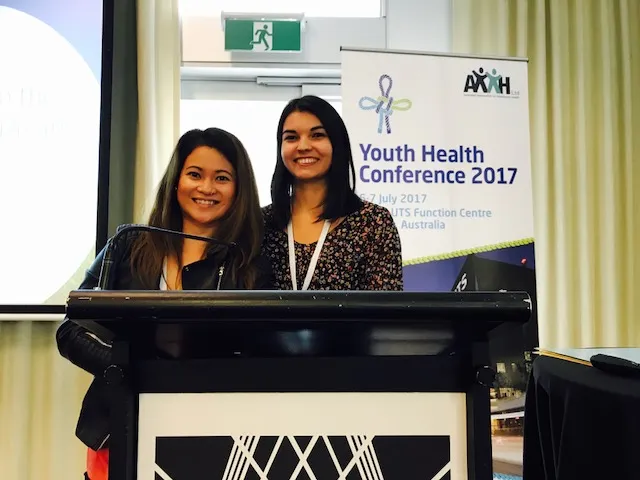
Last month, Nia and I flew to Sydney to present at the 2017 Youth Health Conference (#YouthHealth2017 #ConferenceLyf), which is run by the Australian Association of Adolescent Health (AAAH) every two years.
This was my first time presenting at a national conference. It had been a few months in the lead up and it FINALLY happened!
The conference theme was “Youth health, research, policy, practice: tying it all together” and covered topics including youth led programs, young people facing inequality, health integrated with education, and emerging clinical issues and service innovations. Nia and I presented alongside a number of other projects that also focussed on youth-led peer education. It was awesome to see some of the different ways around the country young people are working together to educate and empower each other.
Nia and I had planned and prepared our presentation a few weeks prior, and in that time I was able to reflect back on my experiences and all that we have achieved during the last 12 months.
I have never had a job that I’ve loved more. I get to work with lots of different young people, talk about topics and issues that are both important and fascinating to me, learn new things and build skills every day, and think both analytically and creatively about how we do things. For me personally, I have been a part of:
- Planning, producing and delivering workshops and trainings for youth and professionals in the youth sector
- Creating fun new activities to teach people about STIs and BBVs, respectful relationships and consent
- Filming and producing our sexual health week videos and (very recently released) Creating Safe Spaces online video training series
- Getting artsy and designing the covers of our new condom packets
- Work on social media graphics and posts
- Collaborating with organisations including the WA Health Department, SHQ, headspace, hepatitisWA, WA AIDS Council, Youth Disability Advocacy Network (YDAN) and MYAN WA
I wrote a short testimonial to read at our presentation, sharing my feelings about being a YEP Crew peer educator. Here it is:
Being a member of the YEP Project over the last year has been the most amazing experience for me. I tell literally everybody what I do for work, and that it’s my favourite thing ever. This has been the most fun I’ve ever had out of any project I’ve participated in.
I studied a double degree with health promotion and nutrition for five years at Curtin University. Since I graduated, I’ve applied for jobs and looked for opportunities coming from the point of view of a newly qualified public health professional. What this job has shown me, and that I didn’t really expect, is my expertise in being a young person & realising everything that I have to offer just by being me.
To be given a chance to use my voice, to draw from my experiences, and to actively reach out and contribute to bettering lives of young kids all over WA and beyond – it’s an amazing and rewarding feeling.
We – the YEP crew – have been given a lot of room to be creative and to try to do things differently in order to address issues that we identify as priorities that we want to make better.
I was raised in quite a conservative catholic household. From a very young age I learned that kissing, nudity and sex is naughty. I didn’t get a very extensive “talk” from my parents, or my school for that matter. I’m certainly not the only one with this experience. Knowing everything I know now, there is so much I wish I had been taught and equipped with as I grew up and entered adulthood.
Sexual health education is so SO much more than being able to put on a condom or prevent pregnancy. And talking about it, by the way, doesn’t cause young people to have sex sooner. To me, it has everything to do with agency, with being in control of your own life and wellbeing, with caring for and respecting yourself and others. Skills that people should have as they enter adulthood and use for the rest of their lives. It’s a vital aspect of being healthy and happy.
I don’t pretend to know or understand everything that one young person is going through. But I can listen, I can relate, and I can try to point them in the right direction. I can be an opportunity to talk about things that wouldn’t usually be talked about, and do it in a way that makes them feel understood, included, and empowered. For me, if I can be a positive support for just one young person, to empower them to make an informed decision about their personal health and wellbeing, then all of this is worth it.
